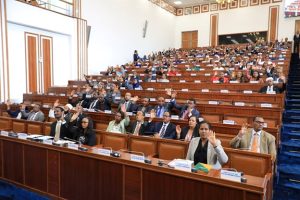
Africa, the world’s most populous and resource-rich continent, has long been sidelined on the global stage, often lacking a meaningful voice in international affairs. With approximately 1.4 billion people, the continent’s immense potential remains underrepresented, particularly in influential bodies like the United Nations Security Council (UNSC). As global actors increasingly recognize Africa’s significance due to its strategic location and abundant resources, the call for greater representation has become urgent.
For decades, Africa has sought enhanced representation at the UNSC, the body responsible for global peace and security. Recently, the UNSC announced plans to include two African countries as permanent members, albeit without veto power-this marks a significant yet partial acknowledgment of Africa’s aspirations. Since its establishment in 1945, the UNSC has faced criticism for its lack of credibility, especially due to the absence of representation for a continent housing the majority of the world’s population.
A researcher at the Africa Research Center of Addis Ababa University,DechasaAbebe (PhD) noted that discussions about global governance have gained momentum, particularly from the perspective of Global South countries. “Africa’s quest to reform the UNSC has captured the attention of the Global North,” he stated. However, the representation of Africa-54 countries and 1.4 billion peoples- often mistakenly seen as a monolith rather than a diverse region with varied interests and needs.
The scholar highlighted the ongoing exclusion of African nations from decision-making processes that impact their futures. While the recent UNSC announcement is a positive step, the lack of veto power remains contentious. “The Security Council must be representative, inclusive, transparent, effective, and accountable,” he asserted.
Echoing these views, Director of Interaction for Change in Africa, WorkuYacob (PhD), stressed that Africa’s significant population and resources should not be overlooked. Despite the continent’s potential, its voice has often gone unheard on global platforms. “It is essential for African countries to unite in advocating for comprehensive reforms of the UNSC,” he urged, emphasizing the need for a common African position.
Since its establishment, the UNSC has faced criticism for its exclusivity, leading to a decline in credibility. African nations deserve permanent representation on this crucial council, which plays a vital role in international peace and security. The African Union (AU) must also enhance its efforts to advocate for the continent’s rightful place in global governance.
The recent proposal by U.S. Ambassador to the United Nations, Linda Thomas-Greenfield, for two African countries to gain permanent seats at the UNSC is noteworthy. While this reflects an acknowledgment of Africa’s significance, it highlights the limitations of the current structure, where five permanent members hold veto power and considerable influence over global decisions, including binding resolutions and sanctions.
As the world order evolves, Africa must assert its rightful place in global discussions. The continent’s collective efforts to enhance its representation at the UNSC are crucial not only for its own interests but also for the global community. It is imperative that Africa’s diverse voices are heard and valued in shaping the future of international governance, the experts remarked.
BY HAILE DEMEKE
The Ethiopian Herald October 6/2024





